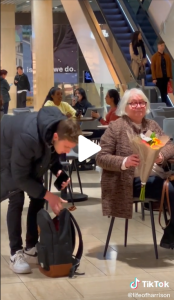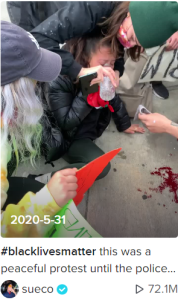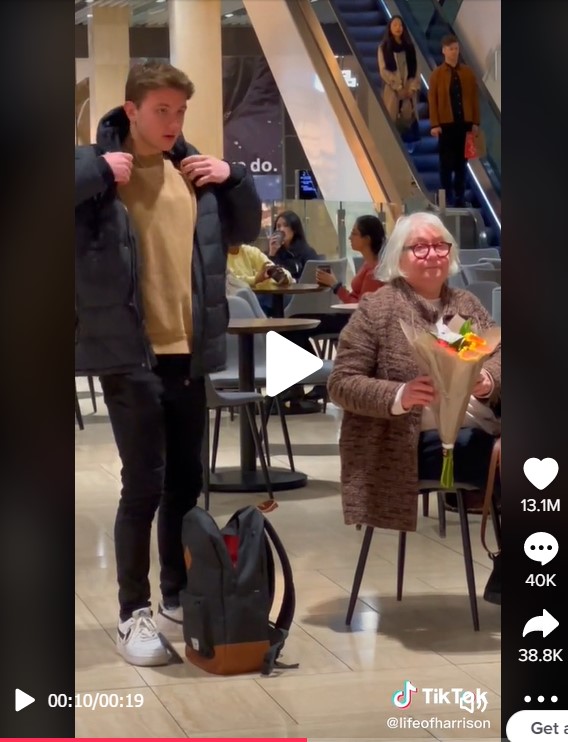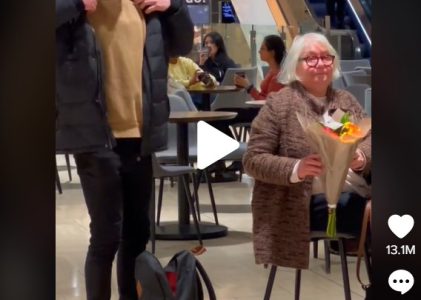Dear readers,
I’m an experienced broadcast journalist and now a Communications Specialist in the development sector, but never before have I had to invest so much of my identity to produce such brief content as for my 13-second video for this blog (go on, watch and have a giggle).
One just needs to scroll TikTok for a moment to realise large swathes of TikTok content is intrinsically linked with personal identity and experience, with users always front and centre.
I couldn’t help but think that TikTok was just a channel for a bunch of egomaniacs, or was it?
I felt appalled after watching an Australian TikTok influencer’s video (pictured) in which @lifeofharrison secretly recorded himself giving an older ‘lonely’ woman flowers (receiving 50+ million views) to promote kindness. The woman later saw the video and lambasted him on the radio. She hadn’t consented to it, she didn’t want the flowers and had tried to return them and said she had been dehumanised and exploited for profit and entertainment.

Prolific TikTok researcher Crystal Abidin, wrote in 2020 that influencers, like @lifeofharrison, can earn up to $20,000 per post and a number draw in up to $5 million a year from Tik ok. Potentially, @lifeofharrison decided to overlook the rights of his subjects for monetary gain. This somewhat sickening need to get attention and amplify content has been labeled by the ‘attention economy’. Theoretical physicist Micheal Goldhaber asserts that the attention economy is a system that involves ‘paying, receiving, and seeking… the attention of other humans which is ‘intrinsically limited and not replaceable by anything else’. Goldhaber repeatedly said that ‘true modesty or humility’ is difficult to maintain in the attention economy where people engage in displays to be noticed by others.
I can no longer be a TikTok hater
As much as I want to write off TikTok for bank-rolling shallow and self-serving users, I can’t.
The more I dig, the more I realise it’s a unique and bizarre platform that genuinely has content for everyone (see my own video in the welcome post). It doesn’t mean I have to like all the content. It means the good comes with the bad which also comes with the ugly. (I have caught myself watching videos by comedians mocking influencers as well as getting parenting hacks from child psychologists and nutritionists and I kept scrolling!).
At New Media Activists, we are here to provide critical thoughts on TikTok specifically in relation to digital activism and social engagement.
It’s hard to ignore the positive role TikTok has played in supporting digital activism and social engagement.
Two researchers from the United States and Israel, Ioana Literat and Neta Kligler-Vilenchik, who studied the political expression on TikTok found it provided a space for political statements and for people to be gathered and pressed into action quickly.

Recent examples include the mass false-registration drive ahead of Trump’s rally in Oklahoma and the amplified videos and commentary on police brutality and Black Lives Matter (BLM) protests globally (more detail in my fellow blogger Kat’s post).
But, here’s the interesting part, summarised by the New York Times, researchers didn’t find a united community with a collective political identity, instead a diverse and varied group that included dynamic and influential liberal activists as well as an abundance of conservative political expression, and pro-Trump voices. For instance, on TikTok people lip-sync speeches by Trump or Obama (both earnestly and sarcastically from both sides of politics) during the 2016 American election.
Essentially, TikTok is a messy melting pot of expression, of young people who are discovering the capabilities and limits of a platform.
What I find utterly fascinating and unexpected is how the platform’s unique tools, known as ‘shared symbolic resources’ promote political expression for youth, in particular, to engage and connect with like-minded audiences. Dr. Kligler-Vilenchik researchers explains that shared symbolic resources can be: “physical (MAGA hats), visual (the closed fist for the Black Lives Matter movement) or hashtags (#alllivesmatter). TikTok-specific elements like viral dances, popular soundtracks, etc. are also shared symbolic resources that help facilitate connections.“
While I’m impressed by how TikTok has managed to infiltrate and connect so many people, I’m still unsure of just how effective it is in the long term when it comes to digital activism. My fellow blogger Kat writes that the derogatory terms slacktivism, virtue signalling, keyboard warriors could imply that online engagement in social causes might be just lazy non-committal clicking and showing off a ‘woke’ persona to the virtual audience without actually understanding the issues. Also, in humanitarian development, a key principle often spoken about when engaging in new settings is ‘do no harm’. Can we say this has been followed by TikTok? A recent BBC investigation showing TikTok profiting from live streams of families begging suggests otherwise.
In my next blog, I’ll answer some crucial questions about if TikTok is doing harm and question the effectiveness of TikTok in digital activism.
Thank you very much for reading to the end and I look forward to lively discussions directly on the post’s “Comments” section as well as on Facebook and Twitter. How can we measure the success of TikTok videos? Is it in the virality of a video? Or the number of individuals reached? Or the amount of media attention it gets or when change is demanded and achieved or all of the above? And who are the losers and what are the limitations of the platform? And what is something you feel was missing in the analysis? I’m eager to know and to broaden my horizons. Thank you in advance for the engagement!
“Read” you next time!

